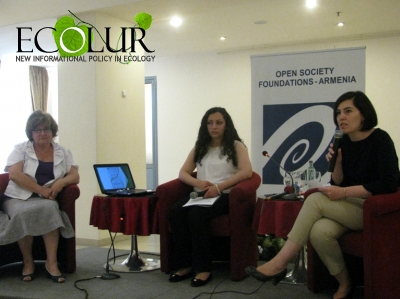

EcoLur
On 4 June the presentation of “SHPP SOCIO-ENVIRONMENTAL IMPACT ANALYSIS” report by “EcoLur” Informational NGO members Victoria Burnazyan, Tatevik Grigoryan and Monica Yeritsyan was held at Ani Hotel, while “EcoLur” Informational NGO President Inga Zarafyan was the expert. The organizer of the discussions is OPEN SOCIETY FOUNDATONS ARMENIA.
Victoria Burnazyan presented the findings of the research:
- The SHPP load on 47 rivers out of 28 is within standards, 16 are in critical and 3 in disastrous condition.
- The analysis of project EIAs shows that the projects don’t comply with the requirements of RA Law “On Environmental Impact Expert Assessment”, as well as they violate the environmental legislation - RA Codes on Water and Forest, RA Laws “On Environmental Impact Expert Assessment”, “Specially Protected Areas of Nature”, “On Flora”, “On Fauna”, “On Lake Sevan”.
- The public hearings have imitation nature, the opinions of community residents are not taken into consideration in decision-making, public hearings are held in violation of the provisions of RA Law “On Environmental Impact Expert Assessment” and the Aarhus Convention.
- “Environmental Expertise” SNCO of Nature Protection Ministry works non-transparently : it refuses to provide the minutes of the public hearings, opinions and environmental expertise conclusions.
- The dialogue with international financial institutions showed that they are interested in 100% loan repayment and not in protection of environment and improvement of social welfare.
Inga Zarafyan mentioned that the problem of SHPPs is the problem of the system. “The governmental bodies don’t demand to comply with our legislation, not to mention the European standards. The legislative requirements are not complied with from projecting stage, there are n certain requirement, while the data are old – starting from the Red Book, which has legal force. The National Assembly is discussing a bill for two years, which says that SHPPs can’t be constructed in Sevan basin. For example, our endemic fish species get extinct because of the SHPP constructed on the Argitchi River. The residents can see how the fish spill out of the pipes during breakdowns and get spread in their fields. The State Environmental Inspection hasn’t arrived even once to draw up an act. But our endemic fish species get extinct. What about the communities, they don’t get any benefit from the SHPPs,” Inga Zarafyan said.
“In my opinion, the situation should be stopped in Armenia, another monitoring in needed to be carried out in Armenia together with Inga Zarafyan and the Pan-Armenian Environmental Front to understand what is eventually happening and how to stop this process and punish the people, who operate the SHPPs, those ministries and governmental bodies who issue the right to operate SHPPs. We don’t need SHPPs any more. What do we want? To finally refuse from Armenia as our motherland?” said Silva Adamyan, Coordinator of Public Environmental Alliance.
“We should realize that one of the main reasons for the intense development of SHPPs is tariff policy. This policy should be immediately reviewed,” said Pan-Armenian Environmental Front Member Levon Galstyan and mentioned that our officials have one SHPP constructed for their offspring.
“SHPP produce clean energy, but in Armenia it’s implemented in a way, which it turns into a service of business interests,’ Arthur Grigoryan said, a member of Teghout Support civic initiative. He also said that 40% of SHPP projects in Norway is rejected, while in Armenia he doesn’t know any case of SHPP project rejection.
One of the participants raised a question whether there are tools which competent bodies can use to implement the proposals included in the report. Inga Zarafyan mentioned that SHPP constructers should first of all be deprived of funding sources.
A question was raised connected with German KfW Development Bank, which sounds as follows: how it happened that the Bank is creating “Arpi Litch” National Park, on one side, and funds the construction of SHPPs in the same territory, on the other side. The reply was as follows: “We tried to find out from KfW how they assess the SHPP projects they fund, which contradict to our laws. We are not satisfied with their replies. They have certain requirements of funding - 100% repayment etc, environmental requirements are missing and we want KfW’s attention to environmental risks,” Inga Zarafyan said.
“We had a correspondence with KfW Bank presenting them the case with “Argitchi” SHPP outlining that the SHPP is constructed with expired documents.”
June 05, 2014 at 12:21




